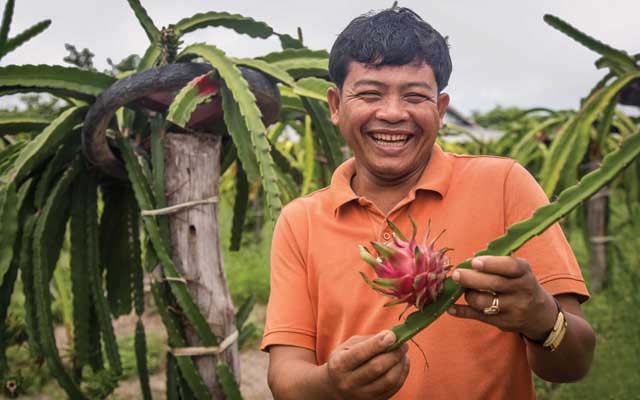As Cambodia’s tourism landscape matures, more locals are taking the lead and devising innovative tours to give visitors a true taste of the country and help them discover outlying areas, while driving social and economic change at the same time. By Marissa Carruthers
Tourism is becoming a stronger force for change in Cambodia as locals take the front seat and devise innovative tours and activities showcasing a more authentic side to the country.
In recent years, more locals are taking the lead in Cambodia’s growing crop of community-based tourism products, a contrast to barely less than a decade ago when the majority of such products were headed by foreigners and NGOs.

“In my experience, tourism is definitely being driven more locally,” said Miles Gravett, Khiri Travel Cambodia general manager. He added that while NGOs and foreign organisations still play an instrumental role in helping initiatives with the initial set-up, many of the operations have today been handed over to locals. “This is great,” remarked Gravett.
Chi Phat is a shining example of how community-based tourism is empowering local communities. Started in 2007 under the guidance of wildlife NGO Wildlife Alliance (WA), the aim of the community-based ecotourism project was to equip locals living in the remote village with an alternative form of income.
Nestled in the heart of the Koh Kong jungle, the area was notorious for illegal logging and poaching activities. WA set about training the village’s hunters and loggers in tourism, helping them open homestays, lead treks and hikes through the jungle, and roll out a series of activities that offer visitors an authentic glimpse into life in this remote part of the Cardamom Mountains.
The project is now entirely run by the community, comprising more than 40 homestays, plus trekking, cycling and kayaking adventures led by knowledgeable villagers. “This project has proven to be very beneficial to the community,” said Chin Meankung, CEO of Cambodian Experiences. “It is a good example of tourism providing extra income and protecting the forests and wildlife from deteriorating.”
Cambodian Rural Development Team (CRDT) is another pioneering locally-led initiative. The NGO was founded in 2001 as a voluntary university student initiative and has grown into a locally-driven organisation working with communities across the country’s north-east to help eradicate poverty and protect the environment.
As part of its mission, it provides tourism and hospitality training for underprivileged youth living in Kratie and the surrounding areas and operates Cambodian Rural Discovery Tours (CRDTours), which are led by local guides and take visitors on a range of locally driven rural trips such as homestays in villages and Mekong islands and visits to family-run businesses and workshops.
The development of these community-based initiatives are also helping to drive visitors to new destinations away from the well-trodden tourist trail. For example, German NGO GIZ has helped communities across remote parts of Siem Reap to develop homestays and other tourist-related activities. It is also currently working with communities in Preah Vihear. After helping with the set-up, the organisation hands over operations to locals.
While agreeing that community-based tourism initiatives help to open up new destinations and encourage longer stays, Gravett remarked that most of such itineraries remain a hard sell for a majority of travellers, “who come to Siem Reap and stay in a five-star hotel for two to three nights and then leave”.
“It’s a constant fight trying to build new destinations,” he added.
That is not deterring Liger Leadership Academy student Samnang Nuonsinoeun, who launched Journeys of Change with fellow students in September 2017. It currently offers bike trips around the outskirts of Phnom Penh, led by students, and is gearing up to launch a market tour and responsible shopping trip.
“Tourism has the potential to (drive) change,” said the 17-year-old. “It’s important that we have really good tours capturing (the essence of) Cambodia and its people. We are seeing more and more Cambodians lead this… they are the ones who live here and can show tourists the authentic (aspects of life); it makes tourists feel more connected and empowers communities.”
Despite the community-driven tourism landscape gaining momentum in Cambodia, Gravett thinks a real challenge for many locally-led initiatives is marketing. “That falls back on us as DMCs to be able to market these projects to foreign travel agencies and tour operators,” he shared.
“The industry has to help a lot of these community-based tourism projects with marketing and driving business. It takes time to develop a new destination and that is what a lot of these projects are doing.”
Coralie Romano, Diethelm Siem Reap branch manager, notes a rise in clients requesting community-based tourism activities.
“We have quite a few people who want to experience at least one night in a homestay and local activities,” she said. “We are seeing more and more visitors wanting sustainable tourism experiences and to give back to communities when they visit.”
Also helping drive the popularity of homestays are the availibility of more comfortable options. While many homestays still remain basic – something Romano says can “surprise” guests – cleanliness and hygiene is on the rise. “The options are much better these days,” she added.
Meankung feels that the new wave of responsible tourists that the community-driven sector tends to attract is also helping Cambodia clean up its reputation as a sex tourism destination. “(The image) is much more positive now,” he stated. “It is still seen as a cheap destination, but that is also changing.”
The merits of locally-led tourism product development extend beyond the industry. Gravett said: “Tourism can play a huge role in preserving cultural and natural heritage and developing communities in Cambodia.”




















